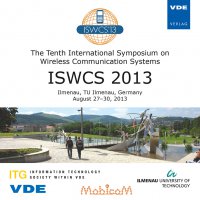Energy-Efficiency based Power Amplifier Selection in Two-way Relay Systems
Konferenz: ISWCS 2013 - The Tenth International Symposium on Wireless Communication Systems
27.08.2013 - 30.08.2013 in Ilmenau, Deutschland
Tagungsband: ISWCS 2013
Seiten: 5Sprache: EnglischTyp: PDF
Persönliche VDE-Mitglieder erhalten auf diesen Artikel 10% Rabatt
Autoren:
Cui, Qimei; Han, Jiang; Yuan, Tianpeng; Zhou, Xiang (Key Laboratory of Universal Wireless Communications, Ministry of Education, Beijing University of Posts and Telecommunications, Beijing, 100876, China,)
Valkama, Mikko (Dept. Electronics and Communications Engineering, Tampere University of Technology, Tampere, Finland)
Inhalt:
In this paper, we evaluate the Energy Efficiency (EE) for Amplify-and-Forward (AF) protocol based two-way relay system with different types of practical power amplifier models, namely Traditional Power Amplifier (TPA) and Envelope Tracking Power Amplifier (ET-PA). We show how to choose or configure PA from the perspective of EE optimization. We use two coefficients, Max-Power-Offset (MPO) and PA-Dependent- Parameter (PADP), to describe PA characteristics, and coefficients Data-Average (DA) and Fluctuation-Coefficient (FC) to describe the realistic 24 hours data traffic behavior. It is shown that the PA selection depends on its configuration and the data traffic model. With coefficients MPO and PADP increasing, TPA gets more energy efficient with nearly 15% energy saved in the simulations. While with DA and FC decreasing, ET-PA performs better with 8% energy saved. The results demonstrate that the PA selection is heavily dependent on the assumed traffic model and that ET-PA may not always be more energy-efficient than TPA.


